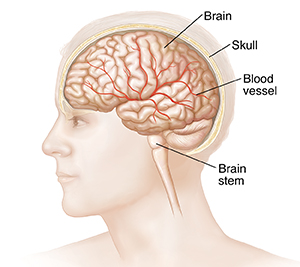What Is Traumatic Brain Injury?
A traumatic brain injury (TBI) is a sudden jolt to your head that changes the way your brain works. The jolt could be caused by a blow to your head, a blast, or an object like a bullet or fragment entering your brain. Falls, fights, combat, sports, and motor vehicle accidents are other common causes.

Types of TBI
A TBI can be mild, moderate, or severe. Most TBIs are mild. Some medical groups refer to a mild TBI as a concussion. Other groups view concussion as a milder subset of TBI. If you have a mild TBI, you might be knocked out for a short time. Or you might just feel stunned for a while. With a moderate or severe TBI, you will be unconscious for longer. Your healthcare team will decide how serious your TBI is based on the symptoms at the time of the trauma, as well as afterward. A tool called the Glasgow Coma Scale is often used to rate the severity of TBI. Symptoms of TBI are unpredictable. This means you could have a mild TBI and actually have symptoms that last longer than someone with a more severe TBI.
Types of damage
When the brain strikes the skull or twists on the brain stem, brain tissue tears. This injury may then cause a second type of damage, such as bleeding or swelling in the brain. Healthcare providers try to control the second type of damage to help limit long-term problems.
Symptoms of TBI
Having a TBI can change your brain in many ways. A TBI can change the way you think, feel, act, and move. The symptoms depend on the part of your brain that is injured. Common symptoms of mild TBI can include:
-
Headache
-
Confusion
-
Loss of consciousness
-
Dizziness
-
Blurry vision
-
Ringing in your ears
-
Feeling tired
-
Loss of memory
-
Mood or personality changes
-
Trouble sleeping
-
Being off balance
-
Being bothered by bright light
-
Feeling sick to your stomach (nausea)
Symptoms of moderate or severe TBI may include all the symptoms of a mild TBI, plus any or all of these symptoms:
-
Extended loss of consciousness
-
Severe headache that doesn't go away
-
Repeated vomiting
-
Seizures
-
Extreme sleepiness
-
Slurred speech
-
Weakness and numbness in your arms and legs
-
Being very clumsy
-
Being very irritable, restless, or confused
Recovering from TBI
Most people recover fully from a mild TBI. It may take days or weeks. If you have had more than one TBI, your recovery may take longer. Everyone’s brain is different. So your recovery time and treatments will depend on how your brain is healing. Here are some tips to help your recovery:
-
Be honest with your healthcare team. Let them know about all your symptoms.
-
Let your healthcare provider know right away if your symptoms are getting worse or new symptoms appear.
-
Keep all your appointments and follow your healthcare provider's instructions carefully.
-
Give your brain time to heal. Be patient and get plenty of rest.
-
Don’t smoke, take drugs, or drink alcohol.
-
Don’t take any medicines without checking with your healthcare provider first. This includes over-the-counter medicines.
-
Talk with your provider if you have problems managing your emotions, such as laughing and crying uncontrollably. The provider might advise that you take a new medicine.
Recovery from a TBI is unpredictable and is different for each person. Many people can recover fully from a TBI, especially if it is mild. Remember that a TBI can change the way you think, feel, move, and act. The best way to recover is to let your family and healthcare team know about all your symptoms. Work closely with your healthcare team and give your brain time to heal.